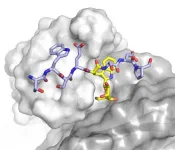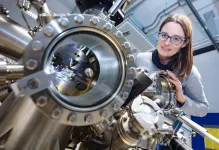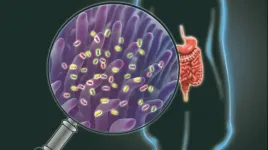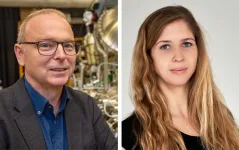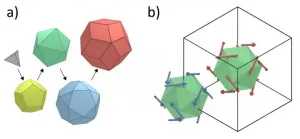'Where did I park my car?' Brain stimulation improves mental time travel
Study used videos of realistic activities to measure how memory works day to day
2021-02-04
(Press-News.org) You might remember you ate cereal for breakfast but forget the color of the bowl. Or recall watching your partner put the milk away but can't remember on which shelf.
A new Northwestern Medicine study improved memory of complex, realistic events similar to these by applying transcranial magnetic stimulation (TMS) to the brain network responsible for memory. The authors then had participants watch videos of realistic activities to measure how memory works during everyday tasks. The findings prove it is possible to measure and manipulate realistic types of memory.
"On a day-to-day basis we must remember complex events that involve many elements, such as different locations, people and objects," said lead author Melissa Hebscher, a postdoctoral fellow at Northwestern University Feinberg School of Medicine. "We were able to show that memory for complex, realistic events can be improved in a safe and non-invasive way using brain stimulation."
The study was conducted on healthy young adults in a controlled laboratory setting. These methods, however, also could eventually be used to improve memory in individuals with memory disorders due to brain damage or neurological disorders, Hebscher said.
The study will be published Feb. 4 in the journal Current Biology.
A new approach to studying memory: Incorporating video
The study authors used TMS with the goal of altering brain activity and memory for realistic events. Immediately following stimulation, subjects performed a memory task while having their brains scanned using functional magnetic resonance imaging (fMRI).
Instead of showing study participants pictures or lists of words - typical practices in laboratory tests that analyze memory - participants in this study watched videos of everyday activities such as such as someone folding laundry or taking out the garbage.
"Our study used video clips that more closely replicate how memory works on a day-to-day basis," Hebscher said.
Following stimulation, study participants more accurately answered questions about the content of the video clips, such as identifying the shirt color an actor was wearing or the presence of a tree in the background.
Additionally, the study found that brain stimulation led to higher quality reinstatement of memories in the brain. Reinstatement is when the brain replays or relives an original event, Hebscher said. Following stimulation, a person's brain activity while watching a video more closely resembled their brain activity when remembering that same video.
"This is why remembering can sometimes feel like 'mental time travel,'" Hebscher said. "Our findings show that stimulation enhances this 'mental time travel' in the brain and improves memory accuracy. These findings have implications for the development of safe and effective ways to improve real-world memory."
How the study worked
The study authors used a brain imaging technique called multi-voxel pattern analysis to compare patterns of brain activity when subjects were watching a video to brain activity when subjects were remembering that same video. The scientists measured the effect of stimulation by comparing memory and brain activity following stimulation of the memory network to the same measures following stimulation of a control brain region that does not belong to the memory network.
During the memory test, subjects watched a large set of video clips and later remembered them and answered true/false questions about the content of the videos. The researchers found that memory network stimulation improved the number of questions that subjects answered correctly. It also increased reinstatement of videos in brain regions associated with visual processing.
"Follow-up studies will work to gather more reliable measures of the brain network responsible for memory in healthy subjects as well as in patients with memory disorders," Hebscher said. "Having a more reliable measurement of this network will help us more easily identify reinstatement in the brain and may help improve the effectiveness of stimulation for enhancing memory."
INFORMATION:
The senior author is Joel Voss, associate professor of medical social sciences, neurology and psychiatry and behavioral sciences at Feinberg. Other Northwestern authors include Thorsten Kahnt, assistant professor of neurology at Feinberg, and postdoctoral fellow James E. Kragel.
This research was supported by grant R01- MH106512 from the National Institute of Mental Health.
ELSE PRESS RELEASES FROM THIS DATE:
2021-02-04
New tools and methods have been described by WEHI researchers to study an unusual protein modification and gain fresh insights into its roles in human health and disease.
The study - about how certain sugars modify proteins - was published today in Nature Chemical Biology. Led by WEHI researcher Associate Professor Ethan Goddard-Borger, this work lays a foundation for better understanding diseases like muscular dystrophy and cancer.
At a glance
WEHI researchers have developed new tools and methods to determine how 'tryptophan C-mannosylation', an unusual protein modification, impacts the stability and function ...
2021-02-04
In order to produce tiny electronic memories or sensors in future, it is essential to be able to arrange individual metal atoms on an insulating layer. Scientists at Bielefeld University's Faculty of Chemistry have now demonstrated that this is possible at room temperature: molecules of the metal-containing compound molybdenum acetate form an ordered structure on the insulator calcite without jumping to other positions or rotating. Their findings have been presented in the Nature Communications journal. The work was done in cooperation with researchers from the universities of Kaiserslautern, Lincoln (UK) and Mainz.
'Until now, it has been difficult ...
2021-02-04
A healthy person has a general balance of good and bad bacteria. But that balance is thrown off when someone gets sick. So, to help boost their levels of good bacteria, many people take probiotic supplements -- live bacteria inside of a pill. Various commercial probiotic supplements are available for consumer purchase, and while health experts generally agree about their overall safety, controversy surrounds their efficacy.
Inside the human body lives a large microscopic community called the microbiome, where trillions of bacteria engage in a constant "tug of war" to maintain optimal levels of good and bad bacteria. Most of this struggle takes place within the body's gastrointestinal tract, as bacteria help with digesting food and support the immune system. Although ...
2021-02-04
New research carried out by City data scientist, Dr Andrea Baronchelli, and colleagues, into the dark web marketplace (DWM) trade in products related to COVID-19, has revealed the need for the continuous monitoring of dark web marketplaces (DWMs), especially in light of the current shortage and availability of coronavirus vaccines.
In their paper, Dark Web Marketplaces and COVID-19: before the vaccine published in the EPJ Data Science journal, Dr Baronchelli and his colleagues analysed 851,199 listings extracted from 30 DWMs between January 1, 2020 and November 16, 2020 before the advent of the availability of the coronavirus vaccine.
They identify 788 listings directly related to COVID-19 products and monitor the temporal evolution of product categories including Personal Protective ...
2021-02-04
Researchers from the University of Missouri School of Medicine have discovered that children who receive a seasonal flu shot are less likely to suffer symptoms from a COVID-19 infection. The finding comes from a review of more than 900 children diagnosed with COVID-19 in 2020.
"It is known that the growth of one virus can be inhibited by a previous viral infection," said Anjali Patwardhan, MD, professor of pediatric rheumatology and child health. "This phenomenon is called virus interference, and it can occur even when the first virus invader is an inactivated virus, such as the case with the flu vaccine."
Patwardhan reviewed records from 905 pediatric patients diagnosed with COVID-19 between February and August 2020 to determine each patient's influenza vaccination history. ...
2021-02-04
Cardiac patients who also have diabetes will be able to do their rehabilitation exercises more safely, thanks to the world's first guidance on the subject, which has been published by international experts including a Swansea University academic.
The guidance will be a crucial resource for healthcare professionals, so they can help the growing number of cardiac rehabilitation patients who also have diabetes.
The guidance, approved by international diabetes organisations, was drawn up by a team including Dr. Richard Bracken of the School of ...
2021-02-04
Scientists at Bielefeld University's Faculty of Physics have succeeded for the first time in imaging the SARS-CoV-2 coronavirus with a helium ion microscope. In contrast to the more conventional electron microscopy, the samples do not need a thin metal coating in helium ion microscopy. This allows interactions between the coronaviruses and their host cell to be observed particularly clearly. The scientists have published their findings, obtained in collaboration with researchers from Bielefeld University's Medical School OWL and Justus Liebig University Giessen, in the Beilstein Journal of Nanotechnology.
'The study shows that the helium ion microscope is suitable for imaging coronaviruses - so precisely that the interaction between virus ...
2021-02-04
People undergoing long-term dialysis are almost 4 times more likely to die from COVID-19 and should be prioritized for vaccination, found a new Ontario study published in CMAJ (Canadian Medical Association Journal).
"As the COVID-19 pandemic proceeds, focused efforts should be made to protect this population from infection including prioritizing patients on long-term dialysis and the staff treating them for SARS-CoV-2 vaccination," writes Dr. Peter Blake, provincial director, Ontario Renal Network, Ontario Health, and professor, Schulich School of Medicine and Dentistry, Western University, ...
2021-02-04
It is necessary to develop additional COVID-19 vaccines, as different vaccine approaches have their advantages and disadvantages and may work synergistically. Researchers at Karolinska Institutet in Sweden now report that they have developed a prototype vaccine against SARS-CoV-2 using a DNA vaccine platform that is inexpensive, stable, easy to produce, and shows a good safety profile. A study published in Scientific Reports shows that the vaccine induces potent immune responses in mice.
The vaccine, called DREP-S, is administered as DNA and is based on a DNA-launched self-amplifying RNA (DREP) platform developed at Karolinska ...
2021-02-04
Between chemistry classes, gemstones, and electronics, the idea of crystals, substances with an ordered and periodic arrangement of atoms is quite common. But about 40 years ago, a strange particle was discovered by scientists that hasn't become commonplace in our world yet: quasicrystals. These are structures with curious atomic arrangements, which, while superficially similar to crystals, lack periodicity despite being ordered. Because of their structures, quasicrystals exhibit symmetries forbidden to crystals and are endowed with interesting properties that crystals cannot show, ...
LAST 30 PRESS RELEASES:
[Press-News.org] 'Where did I park my car?' Brain stimulation improves mental time travel
Study used videos of realistic activities to measure how memory works day to day
